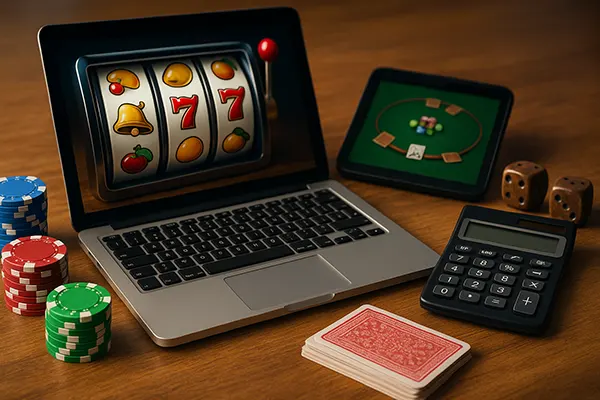Player Tools: How Demo Games, Calculators and Strategy Simulators Work

Modern gambling is no longer limited to spinning reels or placing chips on a table. In 2025, players have access to a wide range of digital tools that improve understanding, planning and strategy. Among the most widely used are demo games, probability calculators and simulators designed to test betting approaches. Each of these tools plays a role in building a more conscious and informed gambling experience, where practice and knowledge reduce risks and improve decision-making.
Understanding Demo Games
Demo games are free-to-play versions of popular titles, available without requiring deposits. They allow players to explore mechanics, payout structures and bonus features without financial risk. For example, slot machines in demo mode present the same volatility and return-to-player percentage (RTP) as their real-money equivalents, which means practice sessions can realistically reflect the game’s behaviour.
In 2025, demo games are used not only by beginners but also by experienced players who want to analyse updates, compare providers or rehearse their bankroll management skills. Many developers integrate demo versions directly into their catalogues, ensuring accessibility both via desktop and mobile devices. This universal availability makes them an indispensable tool for testing new releases.
However, it is important to note that demo play cannot fully replicate the psychological aspect of betting real money. The absence of risk often leads to more aggressive strategies in free mode. Therefore, players should remember that results achieved in demo sessions may differ once real stakes are involved.
Benefits and Limitations of Demo Play
The key benefit of demo play is the opportunity to learn game mechanics safely. New users can identify paylines, bonus triggers and volatility levels without spending their balance. It also helps avoid common mistakes caused by inexperience.
At the same time, demo play has limitations. The lack of emotional tension and financial consequences changes behaviour. A player may chase losses freely or apply unrealistic bet sizes, which would be unsustainable in real sessions. This creates a gap between training and actual results.
For that reason, experts recommend combining demo sessions with controlled real-money bets at low stakes. This hybrid approach offers both technical understanding and exposure to real psychological factors that affect decision-making.
Calculators for Odds and Probabilities
Probability calculators are tools that help gamblers estimate chances of specific outcomes. In 2025, advanced calculators cover sports betting, poker equity, slot RTP estimations and roulette probabilities. By inputting key values such as bet size, odds format or number of combinations, users receive precise calculations instantly.
For table games, such calculators can break down probabilities of blackjack hands, baccarat outcomes or specific roulette results. They allow players to understand house edges better and to make rational decisions. In sports betting, calculators convert fractional, decimal and American odds formats, showing implied probability and potential returns.
The practical role of calculators is not to guarantee winnings but to prevent misjudgements. They remove guesswork and offer transparency, especially for complex bets like parlays or accumulators, where manual calculation would be time-consuming and error-prone.
Practical Uses of Calculators
Many players rely on calculators to evaluate risk-to-reward balance before committing funds. For example, when faced with two different bets offering similar returns, calculators highlight which option carries a lower implied probability of success. This knowledge helps in choosing the more rational wager.
In card games such as poker, calculators are invaluable for learning equity distribution in specific hands. Knowing whether a draw has 30% or 15% chance of success significantly affects betting patterns. Over time, this develops better instincts and prevents costly misreads.
Beyond individual use, operators also publish calculators as educational resources, building trust with players. Transparent tools promote responsible gambling by ensuring participants clearly understand the mathematics behind their choices.

Simulators for Strategy Testing
Simulators are interactive programs that replicate the conditions of casino or betting environments. Unlike demo games, simulators are not limited to a single title but allow players to test strategies across scenarios. In 2025, the most advanced simulators integrate AI-driven analytics, generating detailed reports on long-term outcomes.
For example, a roulette simulator can run thousands of spins to evaluate whether a chosen progression system has any statistical advantage. In poker, simulators test tournament strategies, considering blind increases, opponent ranges and bankroll adjustments. This makes them a key tool for serious players aiming for consistent improvement.
The main advantage of simulators is the scale of testing. While manual play requires hours of practice, simulations can deliver results in seconds. They reveal strengths and weaknesses of strategies without financial risk, allowing players to refine methods before applying them live.
Why Strategy Simulators Matter
Simulators help players separate myths from reality. Many popular betting systems are based on flawed assumptions, and large-scale simulations quickly expose their weaknesses. This ensures players avoid falling into traps of “guaranteed systems” that fail under statistical scrutiny.
Another reason simulators matter is their contribution to responsible gambling. By demonstrating long-term outcomes, they highlight the inevitability of house edge and prevent unrealistic expectations. This educational role is particularly important in 2025, as regulators emphasise transparency and player protection.
Finally, simulators act as training grounds for professional and semi-professional players. They provide a safe space for experimentation, risk assessment and strategy design, turning theoretical knowledge into actionable skill.




